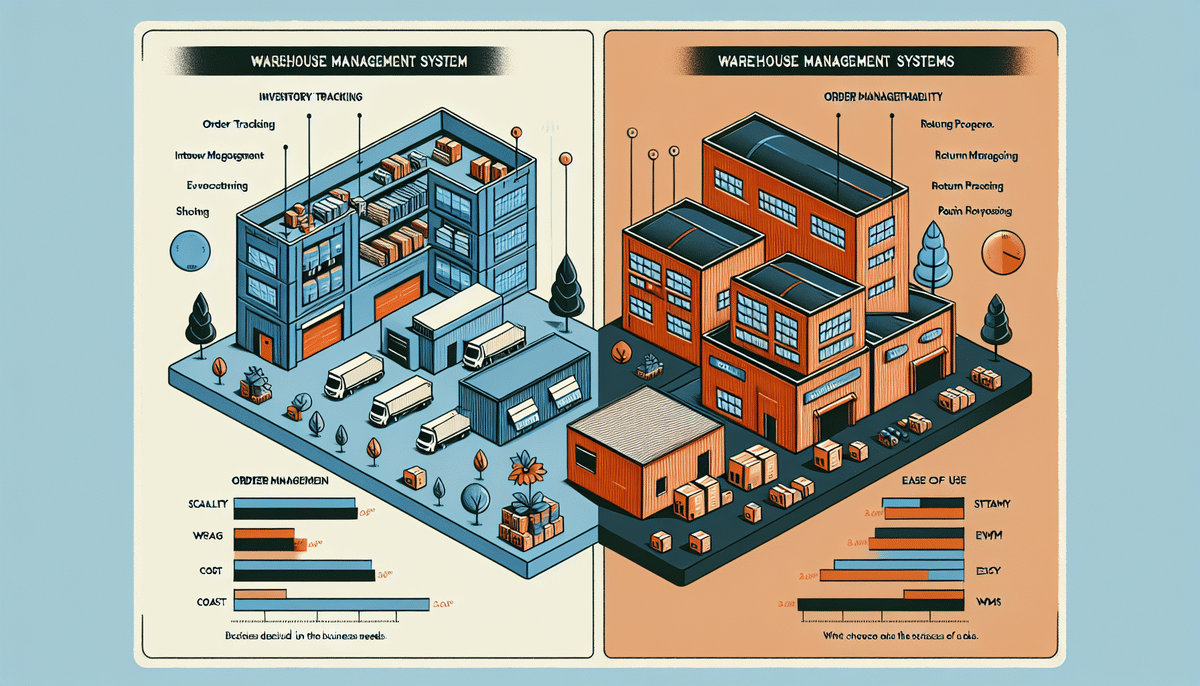Introduction to Warehouse Management Systems
In today’s competitive logistics landscape, efficient warehouse management is crucial for optimizing inventory, resources, and overall operations. Warehouse Management Systems (WMS) like SAP Extended Warehouse Management (EWM) and Manhattan Associates WMS offer comprehensive solutions tailored to different business needs. This article provides an in-depth comparison of these two leading WMS platforms, focusing on their features, scalability, pricing, integration capabilities, support, and user feedback to help you determine the best fit for your business.
Feature Comparison
Core Functionalities
SAP EWM excels in real-time inventory monitoring, slotting optimization, and cross-docking functionalities. It supports advanced warehouse processes, including labor management and value-added services, which are essential for large-scale operations.
Manhattan Associates WMS offers robust order management systems, returns processing, and advanced forecasting tools. Its strength lies in handling complex order fulfillment processes and integrating seamlessly with e-commerce platforms.
Customization and Flexibility
SAP EWM provides a highly customizable platform, allowing businesses to tailor the system to their specific operational requirements. This flexibility is ideal for companies with unique warehouse processes or those operating in specialized industries.
Conversely, Manhattan Associates WMS adopts a more standardized approach with pre-built modules that can be configured according to user needs. This methodology can lead to quicker implementations and lower customization costs.
Scalability and Flexibility
SAP EWM is renowned for its ability to handle extensive warehouse operations, making it suitable for large enterprises with complex distribution networks. Its architecture supports scalability, accommodating growth and increased transaction volumes without compromising performance.
Manhattan Associates WMS is designed to be flexible and scalable, catering to mid-sized businesses that anticipate growth. Its cloud-based solutions enable businesses to scale operations efficiently, adapting to market demands and expansion strategies.
Pricing Models
SAP EWM is part of the broader SAP ecosystem and typically follows an annual subscription model based on the number of users. This model can become costly as the user base grows, but it offers comprehensive access to SAP’s suite of enterprise solutions.
Manhattan Associates WMS provides both perpetual licenses with maintenance fees and cloud-based subscription models billed monthly. The pricing based on the number of transactions allows businesses to align costs closely with usage, offering potential savings for lower transaction volumes.
According to a Gartner report, the total cost of ownership for WMS solutions varies significantly based on deployment size and customization needs, with SAP EWM generally positioned for higher investment environments.
Integration Capabilities
SAP EWM offers extensive integration capabilities within the SAP ecosystem, seamlessly connecting with SAP ERP, CRM, and other enterprise applications. Additionally, it provides pre-built connectors for third-party systems like Salesforce, Oracle, and IBM, facilitating comprehensive system integrations without extensive custom development.
Manhattan Associates WMS integrates effectively with other supply chain solutions, including Transportation Management Systems (TMS), Labor Management Systems (LMS), and Order Management Systems (OMS). Its APIs and middleware support enable smooth integration with various business applications, enhancing operational coherence.
Integration flexibility is critical, as highlighted in a Forrester Wave report, which emphasizes the importance of seamless integration for maximizing WMS effectiveness.
Implementation and Support
Implementation Timelines
The implementation of SAP EWM can be time-consuming, often taking several months due to its complex integration requirements and the need for extensive customization. This makes it well-suited for large organizations with the resources to manage a prolonged deployment process.
Manhattan Associates WMS, with its standardized modules and configurable options, generally offers faster deployment times. Businesses can typically expect a more streamlined implementation process, reducing downtime and accelerating time-to-value.
Customer Support
SAP EWM provides a comprehensive support framework, including a vast knowledge base, online forums, and access to SAP consultants. However, support is typically limited to business hours, which may pose challenges for global operations.
Manhattan Associates WMS offers 24/7 support, including online resources, phone and email assistance, and dedicated training programs. This around-the-clock support is advantageous for companies operating in multiple time zones or requiring uninterrupted system availability.
Real-world Applications and User Feedback
SAP EWM is leveraged by global enterprises such as Procter & Gamble, Nestlé, and Levi’s, which benefit from its robust features and extensive integration capabilities. User reviews highlight its powerful inventory management and real-time monitoring as key strengths, though some note the steep learning curve as a drawback.
Manhattan Associates WMS serves companies like FedEx, Progressive Logistics, and Yamaha Motors. Users appreciate its intuitive interface, advanced order management, and strong customer support. However, some users find it less adaptable for extremely complex warehouse environments.
According to Capterra reviews, both systems receive high satisfaction ratings, with SAP EWM scoring particularly well in integration and inventory accuracy, and Manhattan Associates excelling in user-friendliness and responsive support.
Conclusion: Choosing the Right WMS for Your Business
Both SAP EWM and Manhattan Associates WMS offer robust warehouse management solutions tailored to different business needs. SAP EWM is ideal for large enterprises requiring extensive customization and deep integration within the SAP ecosystem. In contrast, Manhattan Associates WMS is better suited for mid-sized businesses seeking flexibility, scalability, and faster implementation.
When making your decision, consider factors such as your company’s size, specific operational requirements, budget constraints, and the level of support needed. Evaluating user reviews and conducting a thorough needs assessment will further aid in selecting the WMS that best aligns with your business objectives.






















